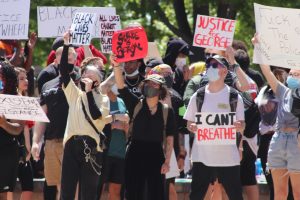UW Oshkosh responds to George Floyd death, UW System continues to struggle with bigotry
June 6, 2020

As protests erupt across the country demanding an end to systemic racism, the UW Oshkosh Police Department and campus administration are taking steps to address the issue.
In response to the May 25 killing of George Floyd by a Minneapolis police officer, which triggered a national movement calling for criminal justice reform, UWOPD Chief Kurt Leibold on Friday announced the passage of a resolution that aims to increase input from underrepresented community members.
“We felt that a resolution was the appropriate way to share our thoughts, offer our apology, promise to serve our community to the best of our abilities and recommit to being a police department with the highest ethical and professional standards accountable to people whose lives we are sworn to protect,” Leibold wrote in a campuswide email.
The resolution says the department will increase community feedback and “thoroughly review every use of force incident” to determine if an officer’s actions were necessary to resolve the situation.
Additionally, the department will take proper disciplinary action after an officer takes inappropriate police actions, the resolution stated.
Also on Friday, UWO Chancellor Andrew Leavitt announced that the university is investigating racist Instagram posts from a female who says she’s a UWO student.
Leavitt says the university is working to verify the authenticity of the posts, account and its potential connection to UWO.
“This much is clear: the content of these posts is disgusting and an outrage. It is against everything we stand for at UW Oshkosh,” Leavitt said in a written statement. “We do not tolerate expressions of racism and hate.”
Leavitt also denounced anyone who would use “appropriated images and imposter social media accounts to spew such bigotry in attempts to disgrace and divide us.”
He added: “Black lives matter and must always matter. As we speak out, we also listen and look within, searching for the systemic change that UWO can help make to achieve justice and lasting equality.”
The investigation comes after Leavitt and the Oshkosh Student Association released statements last week responding to Floyd’s death.
Leavitt wrote that he was saddened by Floyd’s death, calling it the latest example of “explosive accounts of bigotry around the nation.”
He noted racism needs to be stopped, and that UWO has a crucial role to play in raising awareness and building understanding.
“We also commit to the never-ending work of making our campuses safer places in which to learn, live and serve,” Leavitt wrote. “That requires personal reflection and responsibility. And it demands just, transparent and accountable systems, be they higher education or law enforcement.”
The OSA released a statement in opposition of systemic racism, and offering support to students struggling with bigotry.
“We believe that everyone is worthy of dignity and respect,” OSA wrote. “Regardless of race, ethnicity, gender identity & expression, sexual orientation, religious beliefs, socioeconomic status and any other factor, our diversity makes us stronger; it’s who we are.”
However, recent events aren’t the first time campus officials have responded to racism. During the student government elections last March, a member of the college Republicans used derogatory language on Snapchat toward two OSA candidates.
The Snap displayed a picture of two white male candidates with a caption that read: “UWO Vote for these guys today unless you want a lesbian or a hmong to win.”
Then in April 2019, a UWO student tweeted photos from inside another student’s house. One photo showed a whiteboard that read: “No… liberals, Jews, Muslims, Queers or Hmongs.” The other pictured UWO students partying in front of a handmade swastika sign.
After those images surfaced, campus administrators held an open forum and Leavitt released a statement condemning the images.
“To anyone who brings hate into the University of Wisconsin-Oshkosh community, I invite you to leave,” Leavitt said.
While university officials continue to condemn racism, bigotry continues to appear at campuses across the UW System.
In March, The Capital Times reported that UW-Madison saw 81 bias incidents during the spring semester, with 47 involving Asian or international students.
At UW-Milwaukee, The Milwaukee Journal Sentinel reported in February that Almond Moone, a 20-year-old African American of Janesville, was wrongly charged out-of-state tuition after receiving in-state tuition at UW-Rock County.
Moone owed UW-Milwaukee nearly $13,000, and the campus only waived her debt after the Journal Sentinel reported that she was wrongly charged.
Also in February, a former UW-Milwaukee student’s discrimination lawsuit against the UW System Board of Regents was dismissed by the Seventh Circuit U.S. Court of Appeals.
Cherakei Griffin, a female African American student, initially sued the Board of Regents and UWM in April 2019 for allegedly charging her out-of-state tuition despite her being a Wisconsin resident.
In a Feb. 27 filing, Griffin wrote that Moone recieved “over 90% of the same discriminatory profiling” as she did, which is “indicative of a serious pattern and practice of racist and sexist discrimination against minority female students.”
In a media briefing Thursday, Gov. Tony Evers described racism as a public health crisis and called on Wisconsin to begin addressing systemic racism.
“We must fix what we know is broken in our society,” Evers said. “We must intentionally address and dismantle individual and systemic racism, discrimination and bias.”













